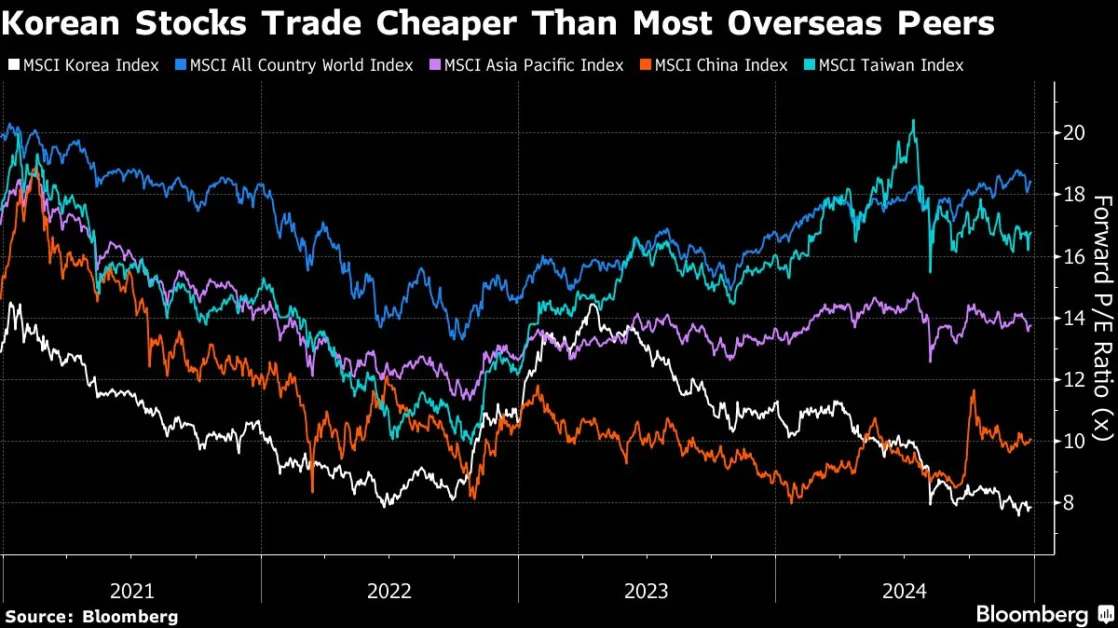(Bloomberg) -- While political crisis looms large over South Korea’s $1.6 trillion equity market heading into 2025, the artificial intelligence boom and Donald Trump’s presidency remain key factors for stock pickers.
The ongoing “Corporate Value-Up” campaign is another top theme in what is one of the world’s worst-performing stock markets. Companies continue to get on board with the plan’s reforms, though a botched martial law decree and impeachment proceedings against the nation’s president have cast doubt over the political impetus.
The benchmark Kospi is on course for its longest monthly losing streak since 2008, with global investors accelerating withdrawals. The index is down more than 8% on the year, compared with an 18% gain in an MSCI Inc. gauge of global equities.
Though known as a tech-dominated market, Korean benchmarks have been weighed down by a 32% slide in heavyweight Samsung Electronics Co. due to its missteps in AI. Meanwhile Trump’s second term increases tariff threats over tech exports and clouds the outlook for electric-vehicle demand.
Investors say Korean stocks will continue to struggle in coming months while the Constitutional Court deliberates the impeachment of President Yoon Suk Yeol. At the same time, China’s big stimulus plans threaten to steal investor cash flows away from South Korea.
There are bright spots in the market, however, with the AI and governance improvement themes continuing to mint select winners. Overall, the cheapness of Korean stocks may provide some appeal as well.
“Excessive pessimism is what we’re seeing in the market right now,” said Yi Ping Liao, assistant portfolio manager at Franklin Templeton Emerging Markets Equity. “While the economic and earnings outlook is on the weak side, we do have quite a lot of valuation cushion,” and this in turn creates bottom-up opportunities, she said.
Here are the major winners and losers in the South Korean stock market in 2024.
Winner: Power Equipment
Power equipment suppliers were among the biggest gainers in emerging markets this year, as investors wager that electricity demand from AI data centers will trigger demand for new and upgraded gear at global grids. HD Hyundai Electric Co., which makes transformers and generators, topped the Kospi with a gain of more than 370% this year.
Winner: Noodle Maker
Another star this year was Samyang Foods Co., whose shares jumped more than 250% on surging demand for its spicy buldak noodles in the US and elsewhere helped by a viral TikTok video.
There is still “reasonable upside” in Samyang Foods, according to Kim Doo-Yong, chief executive officer at Must Asset Management. The stock contributed the most to the 50% gain Kim’s flagship fund posted this year, and he remains a holder. For 2025, he will be focused on finding about 20 such “diamond-like” stocks that can outperform.
“When the overall market is not attractive, the attention and the flow gravitate toward a few attractive stocks,” Kim said.
Winner: Banks
Korean banks are headed for their best year since 2017 on expectations they will respond more quickly and actively to the government’s corporate reform drive and boost shareholder returns. Sector leader KB Financial Group Inc. is up nearly 60% this year, poised for its best annual performance since 2009.
Loser: Samsung
Samsung’s stock is on track for its worst year since 2000, amid growing doubts over its technological leadership after it fell behind in making memory chips to work with AI processors. Global investors have sold about $7 billion worth of the stock in 2024, on a net basis.
South Korea’s largest company had signaled progress on efforts to supply its most advanced chips to Nvidia Corp. two months ago, but investor hopes have receded further since then. Meanwhile, Samsung’s woes have been good news for rival SK Hynix Inc., whose shares have gained more than 20% this year on excitement for its AI products.
Loser: EV Batteries
It was a miserable year for South Korea’s EV battery suppliers, a sector once loved by the nation’s retail investors. Larger stocks that trade on the theme including Samsung SDI Co., Posco Holdings Inc. and LG Chem Ltd. have dropped around 50%, while smaller Ecopro BM Co. has tanked more than 60%.
The group has been hit by weak demand outside of China as well as Trump’s vow to repeal the US Inflation Reduction Act, which provides credits for EV purchases. The outlook may improve next year on EU emissions policy, more affordable models and signs of industry consolidation and growth, said Franklin Templeton’s Liao.
While it’s difficult to say the Korean EV battery sector is at the bottom, “we might be close,” she said.


